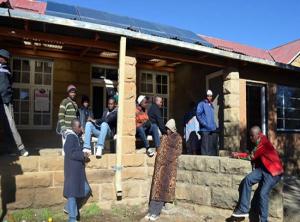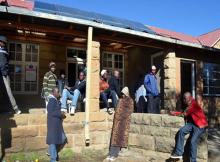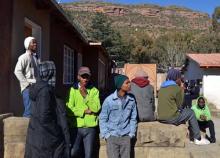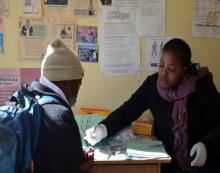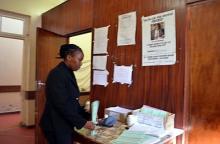Ministry of Health commences Voluntary Male Medical Circumcision services scaling up to tackle the HIV epidemic in Lesotho
Lesotho has the third highest HIV prevalence in the world and more than one in five adults are HIV-Positive. The impact of HIV on individuals, families and the whole nation is being felt as adults become too sick to work and children orphaned by AIDS are left to run households.
It is against this background that the Ministry of Health decided to increase the Voluntary Medical Male Circumcision (VMMC) programs in February 2012 at four hospitals- Berea, Mafeteng, St Joseph and Scott to tackle HIV/AIDS, hence the development of the VMMC policy and Operational Plan for the purpose of enhancing the scaling up of prevention and impact on reduction of new HIV infections as well as contributing to High Level Commitment to 3 zeros; new infection, AIDS related deaths, stigma and discrimination.
Scott Hospital, Morija, was chosen as the pilot location to conduct phase 1 of the intensive mass circumcision program targeted at the youth of the country. It started on 25th June 2012 and ended 13th July 2012,with approximately 40 clients operated on every day.
Before this, MC procedures were only carried out in the hospitals twice a week. This intensive phase coincided with the schools winter break so that male youths would be free to attend the services. This phasing up of MC services is an attempt by the government towards accelerating HIV prevention in this country, using MC in conjunction with health education as the driving forces.
MOH commences VMMC services scaling up to tackle the HIV epidemic in Lesotho
“(Intensive) programmes to provide access to VMMC and related HIV-prevention services have been given. More than 1,715 tested for HIV and 1,114 men have availed themselves of the benefits of male circumcision, which partial protection against HIV and several other sexually transmitted infections (STIs), as well as reduced risk of genital cancers among men and their female partners”, said Ms. Shoeshoe, a counselor from the Scott Hospital.
Ms. Shoeshoe described the process that MC clients go through in the resource-limited setting: first a group education session with the males takes place, then individual counseling with one of the counselors, followed by screening and giving informed consent before the procedure itself takes place.
The education session includes: giving basic facts about MC and HIV, cautioning against risky behavior after MC that could lead to HIV or other STIs, explaining and emphasizing condom effectiveness and use and promoting regular HIV testing. All clients have a right to pre- and post-operational counseling and referral to other sexual and reproductive health services.
Mr. Molupe Fenyane, a MC client from Ha Abia, learnt that his beliefs about circumcised men were incorrect. “I thought that MC is confirmed to be an effective intervention to eliminate the risk of acquiring HIV, only to find that MC lessens the risk but does not give complete protection against the virus”, he said.
Ms. Shoeshoe said that most of the young men who went there did not understand fully about MC because they only have misconceptions that when circumcised they do not get HIV and STIs. “Circumcised men are 60 per cent less likely to get infected with HIV”, she observed, but need to practice safe sex to eliminate the risk.
This scaling up phase in Morija has shown the interest among young Basotho for MC, with males travelling quite a distance to the hospital for the procedure and demand being very high. Plans are in place to extend the program and expand to all other hospitals before the end of 2012.



